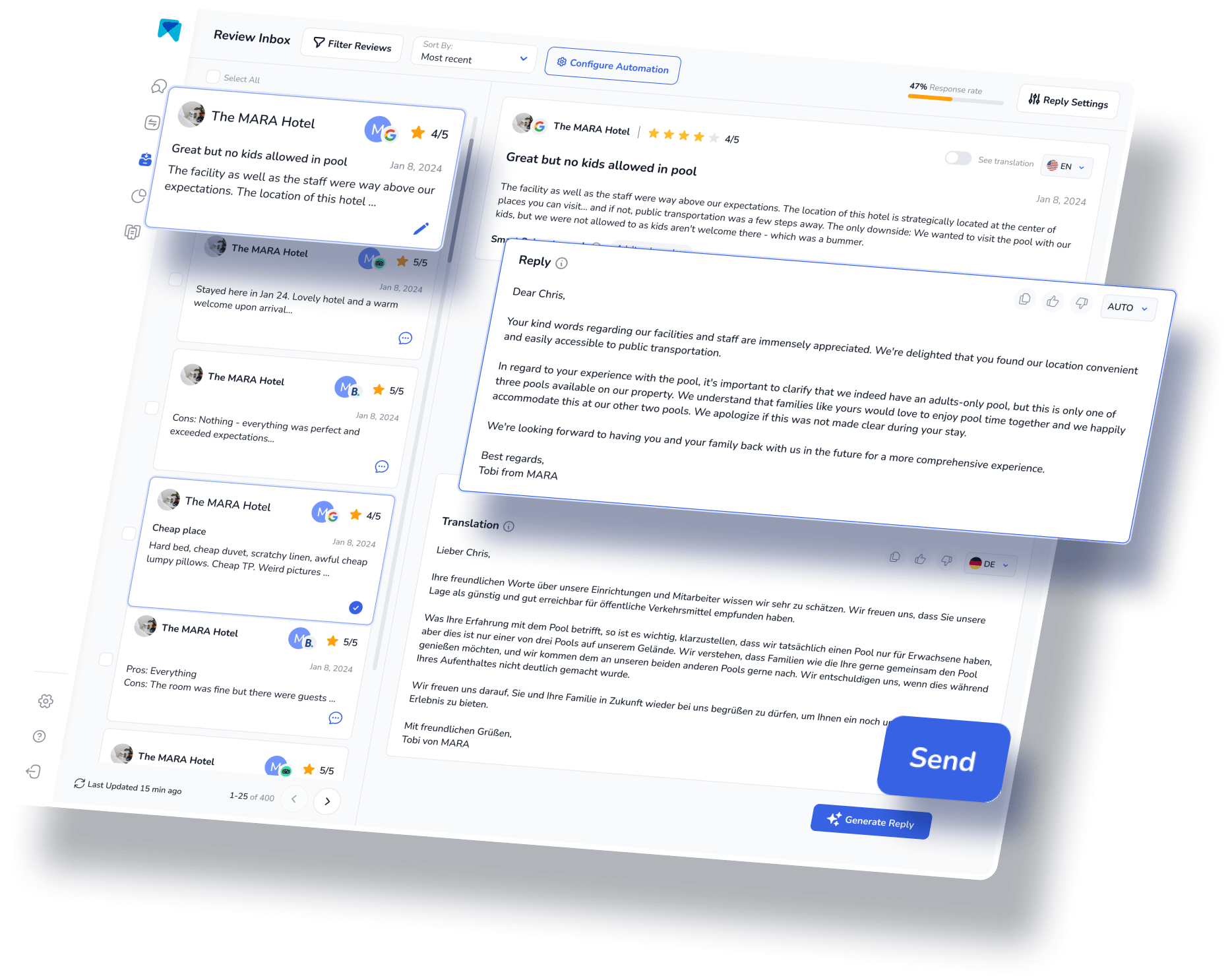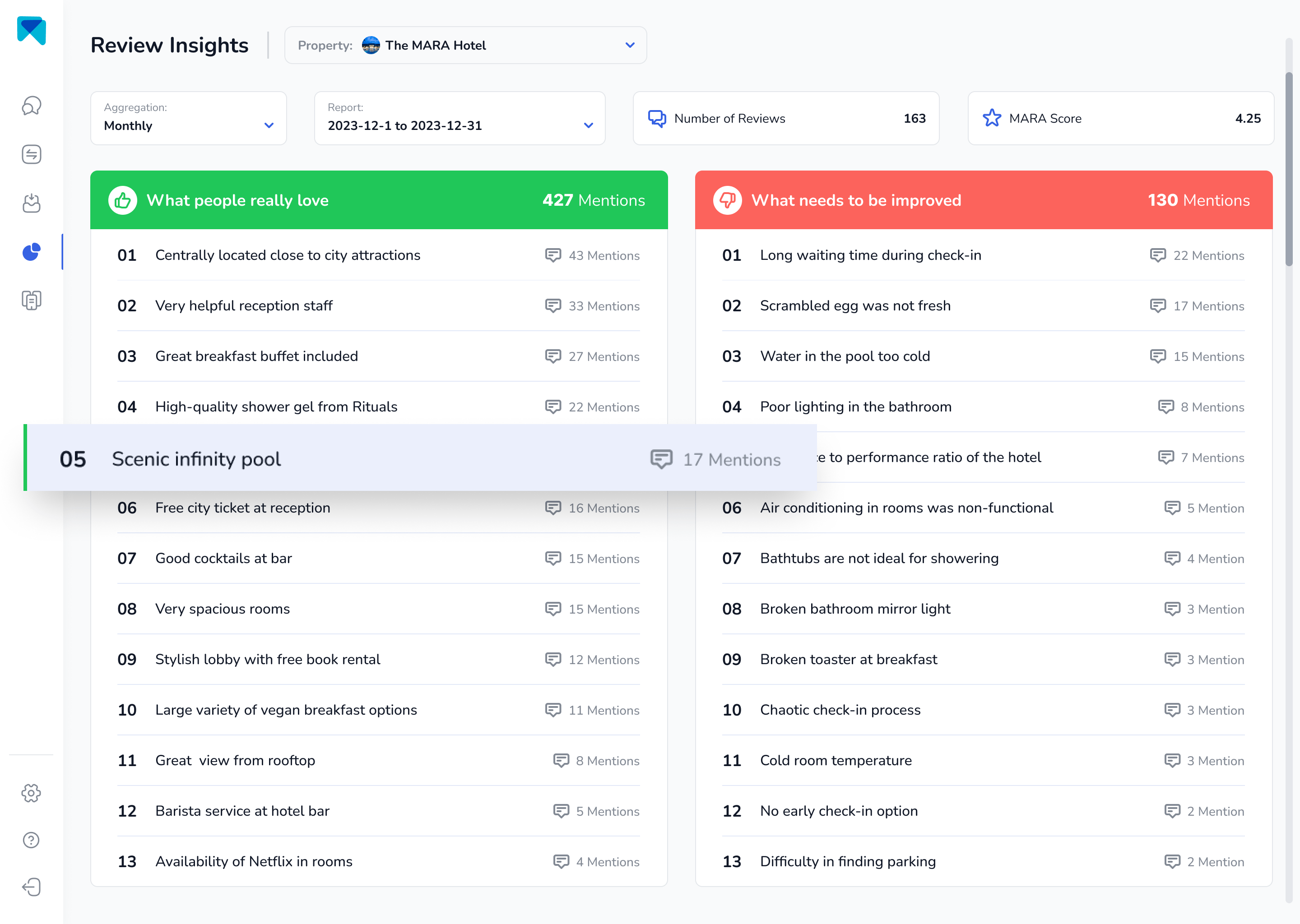Every hotel manager knows that online reviews are currently one of the biggest marketing tools today. Whether you're a renowned 5-star hotel or a meek community lodging, it's essential to know the current trends in customer reviews to maintain an excellent online reputation.
In this blog, we'll help you recalibrate your marketing strategies by sharing with you some of the most important online reviews statistics every hotel needs to know in 2025.
What percentage of people use online reviews?
Numerous surveys conducted in the past 5 years have proven that online reviews actively affect people's travel plans.
70.9% of travelers say online reputation influences their choice of accommodation, and a whopping 81% say they always read reviews before booking a hotel, with particular consideration on the company's response to guest reviews.

On the other end of the spectrum, 86% of people would pass off a good deal from a company with bad reviews. Aside from this, one unaddressed negative review can easily drive away 30 out of 50 customers.
Unfortunately, while these statistics effectively prove the importance of replying to online reviews in the hotel industry, not all hotels respond to this trend accordingly.
{{blog-cta="/features/product-updates"}}
What percentage of consumers trust online reviews?
3 out of 4 consumers said they avoid online ads due to the rise of false advertising, making online reviews even more valuable to customers. And while false advertisements can't be caught without a person purchasing the product or services, online review websites have their ways of catching fake reviews. Some websites take down reviews from inactive accounts, and some track the IP address of suspicious reviewers. When it comes to fighting fake reviews, Amazon is certainly leading the way with a $700 million investment in 2020 to detect and delete fake reviews.
Here's the truth: Fake reviews will probably never be 100% identified and deleted, but publishing fake reviews on a large scale is extremely difficult nowadays, and consumers can often spot them easily. And more importantly, no matter what you think of reviews, guests care about them and consider the hotel's responses before making a purchasing decision.

56% of customers change their opinion about a business upon checking the responses given to online reviews, and customer churn increase by 15% for every unanswered feedback. So, it's really essential for hotels to boost their authentic reviews through well-written responses.
How many people on average leave a review?
Surprisingly, nearly 74% of consumers claim they mostly leave online reviews for local businesses.
For the travel and hospitality niche, however, people need a certain level of nudging. 78% of travelers only post reviews if they're encouraged by a brand. The most proficient way of collecting reviews from travelers is via email, which has a 41% conversion rate, during in-person transactions at 35%, and via SMS at 27%.
What age group is more likely to leave reviews?
Younger generations tend to be more participative regarding the sales process. 66.7% of the consumers, specifically those at 16-24 years old, post online reviews. However, it’s worth noting that the same age bracket would automatically post negative reviews when unsatisfied.
Do consumers trust online reviews as much as personal recommendations?
Consumers still trust personal recommendations from family members and friends over advertisements or reviews. However, if no personal recommendations are available for the product or service they're about to purchase, 49% of customers say they rely on online reviews.
How much do online reviews affect sales?
The slightest increase in a brand’s rating on major online review websites such as Google, Tripadvisor, and Yelp can create a significant impact on sales. According to a study from Harvard Business School, a 1-star increase can contribute to a 5-9% increase in revenue.
How do online reviews affect the hotel industry?
Researches suggest that more than 80% of travelers read reviews before booking a hotel. Furthermore, a survey among luxurious hotel owners reveals that 73% of hoteliers claim to respond to every review, underlining the importance of online reviews for high-end hotels. For most of these business owners, responding to reviews is a part of complete customer service from previous guests and a marketing strategy for potential ones.

According to MARA's research, the average response rate of hotels across all types and regions is only at around 40% overall. The top reason hotels still can't keep up with the overwhelming need for a positive online presence is the time needed to write a good reply to online reviews.

What percentage of hotel guests leave reviews?
40% of travelers leave reviews when they experience exceptional service at a hotel. Unfortunately, a slightly higher figure of 48% tends to leave reviews if they had a bad hotel experience.
How effective are Google Reviews for hotels?
As of the moment, the top 5 online review websites for hotels are Google, TripAdvisor, Booking.com, Expedia, and Hotels.com.
72% of hotel bookings happen within 48 hours following a Google Search. As expected, Google is more likely to index online reviews done on Google My Business (GMB) pages than other online review websites – allowing hotels with active GMB profiles to have better visibility in searches than those who don't. This search-and-book process subsequently makes Google the top online review website.

Because of Google's nearly monopolizing the trend of online reviews, it has become increasingly important to write excellent responses to Google Reviews. While these responses are pretty close to how you should respond to other online reviews, there are some specific considerations hotel managers should know.
Speed is essential in optimizing every GMB response. As mentioned, most guests immediately book their accommodation upon seeing Google reviews, so it's best to get an AI review response generator that will allow you to respond within seconds.
Aside from this, writing responses with category and location-based keywords is also essential. This way, you can increase your relevance on Google searches and your website's SEO–hitting two birds with one stone.
How many reviews are needed?
A TripAdvisor survey shows that travelers read 6-12 reviews before choosing a hotel. While these are relatively easy numbers to beat, maintaining a continuous flow of reviews is essential since all online review websites consider recency and relevance when rating their listings.
How much time is spent globally to answer reviews?
This difficulty in keeping up with online reviews also spreads across a variety of industries. MARA's research finds out that approximately 10,437,052 new reviews are posted every day worldwide. With an average response rate of 50% across all industries and an average response time of 6 minutes per review, 521,853 hours are spent each day just responding to reviews.

For hotels, the numbers are similar. Overall, about 933,751 hotel reviews are published per day worldwide. Taking the 6-minute timeframe to answer a single review and an average response rate of 40% in this industry, the total time spent globally to answer reviews is 37,350 hours. Imagine how the guest experience could be improved if hoteliers could spend most of this time with their guests instead.
With this alarming disjunct on the rise of online reviews and the response rate among businesses, AI Review Reply Generators have become an extremely helpful business tool. With excellent responses generated hoteliers don’t need to start writing from scratch which enables MARA customers to answer to reviews in 2 minutes on average instead of 6 minutes.
How to write the best reply for online reviews?
Fortunately, defining the factors that affect customers' purchasing decisions is easy. With over 10 million new reviews posted online globally, the speed of responses is crucial. Unanswered negative reviews can easily reach customers as much as positive reviews do.
Online reviews have gotten shorter by 65%. In 2010, the average online review was 600 words, while the typical review nowadays is only 200 words. With the overwhelming content present on the internet today, people have developed eye fatigue towards long reviews. Customers will only read long and detailed reviews if it's addressing a specific concern they're also thinking about. So, it's essential to have a variety of response lengths–from brief replies to detailed responses.
Most importantly, companies must respond to reviews individually without using a common template. For the hotel and hospitality industry that's heavily reliant on customer service, it's essential that potential guests feel acknowledged and addressed even after their purchase. This practice can effectively boost brand loyalty among guests.
Respond to online reviews faster with MARA.
These data prove that responding to online reviews can be a daunting task. Fortunately, it doesn't have to be with our MARA AI Review Assistant. This intuitive tool is designed to ease your Online Reputation Management process, making it more efficient, personalized, and time-saving. It offers the best and most personalized AI for responding to and analyzing your guest reviews.
Comprehensive Review Inbox
A streamlined Review Inbox can significantly affect hoteliers' response time, and one of the key features of this tool is the Review Inbox. Your review inbox makes responding to reviews as simple as hitting "Generate reply" and clicking "Send". The Review Inbox connects to multiple review sources, including Google, Booking.com, and Tripadvisor, giving you a panoramic view of all your reviews. And you can even configure review response automation: Why not allow MARA to automatically respond to simple reviews, like 5-star Google reviews with no text, ensuring you never miss a review? Daily notifications about new reviews keep you updated and in control.

Straightforward Review Analytics
Regardless of how speedy your response time is to your reviews, if you can’t extract actionable insights, then you won’t be able to make the most out of your collected customer reviews. However, we understand that it could be a tricky task for hoteliers.
To help you understand and analyze the multitude of reviews, the Review Assistant also incorporates Review Analytics. This provides actionable, easy-to-understand insights that are tailored exclusively to your business. With MARA, you can quickly get the gist of all your reviews without needing to read each one. The analysis is so detailed that you can find out about specific issues like "water in the pool is too cold" or "lack of vegan breakfast option”. These insights help optimize guest experience without requiring you to be a data expert.

Set Up Review Automation
Creating response automation can reduce your review management process by up to 60%.Fortunately, with MARA AI Review Assistant, you can even go on autopilot and create automation rules. This way, you can specify which reviews should be replied to by the AI directly with no additional approval. With the configuration below, all Google reviews with no text and a star rating of 4 and above are answered automatically.

The most personal response AI
MARA's AI isn't just about efficiency; it's about personalization too. The Brand Voice feature allows the AI to adapt to your tone, making sure your responses sound authentically you. Plus, with Smart Snippets, you can "teach" the AI how to respond to recurring praises or complaints. Your AI then incorporates this information into its responses, but always with different words, providing more personalized, relevant replies.
This review response assistant has quickly become a game-changer for over 2000 customers. Its promising capacity to elevate your overall rating, amplify response rates, glean insights from customer feedback and economize both time and money, is the reason behind its growing popularity.
Final Thought
Managing online reviews for your hotel need not be an overwhelming task. With the appropriate software, not only can you streamline the process, but you can also personalize your responses, and derive valuable insights from the reviews. So, why hesitate to give our AI Review Assistant, MARA, a try? It's completely free for testing, doesn't require a credit card, and can be fully operational in less than five minutes.
This content is a part of our hero series on “How to Use Online Reviews to Your Advantage – The Ultimate Guide".
Frequently Asked Questions:
Online review sites give potential guests and customers confidence in your brand. A good online reputation mostly leads to higher conversion rates across all industries.
Online reviews provide customers with accurate and relevant information about a business, even those they may wish to conceal in their advertisements. Because of this, online reviews have become an essential factor in customers’ decision-making.
Online reviews are an excellent marketing tool as they provide customers with authentic content. They increase customer engagement by expanding the conversation about your brand, whether good or bad.
Customer feedback provides hotels with accurate customer insights about their services. Through this data, hotel managers would know which areas of operation they should improve to increase customer loyalty.




































-min.avif)
